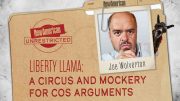
According to the Salt Lake Tribune, March 8, a bill requiring Utah schools to teach that the United States is a republic and not a democracy, is being sent to the governor for his signature, after being passed in both houses of the state legislature.
HB 220 underwent weeks of debate over the definitions of different forms of government, and whether or not socialism is a form of government or a philosophy. Opponents claimed that the bill’s concepts are already being taught in schools and that the legislature needn’t be involved in curriculum matters, but on Monday, bill sponsor Republican Sen. Mark Madsen (pictured above) defended the necessity of the bill, saying some states indoctrinate children in socialism:
This is happening at least in some places in our country, so I believe this is all the more important in this state, so that we can protect our children from such curriculum.
The same day the Senate passed the bill with no dissenting votes, and on Tuesday, the House agreed to some wording changes made in the Senate.
HB 220 ensures that Utah schools teach that America is a “compound constitutional republic,” as well as about other forms of government such as pure democracy, monarchy, and oligarchy. Political philosophies and economic systems such as socialism and free-market capitalism would be included, as well as the principle of individualism.
The Salt Lake Tribune did not elaborate on the “weeks of debate” about the meanings of “republic” and “democracy,” but perhaps a more important point is that the topic is being debated. The fact that the United States was clearly established as a republic is lost in government education today. And if the Beehive State intends to teach its students what a pure democracy is (someone defined it as: "two wolves and a sheep involved in a short debate about what’s for dinner"), in contrast to understanding a republic, then it’s a start on the road back to understanding American government.
But what is a “compound constitutional republic"?
John McManus, President of The John Birch Society and author of the article, "A Republic, If You Can Keep It," offered this explanation:
Perhaps the legislators included the specific language "compound constitutional republic" in order to make the bill passable, or to avoid the interpretation that the U.S. was intended to be a democratic republic. Given the level of misunderstanding among Americans about republics and democracies, they might have wanted to make sure that a true republic is defined and taught.
The CATO Institute describes it thus:
The Constitution of the United States established the basic structure of a compound republic, a federal structure in which there are two or more levels of government [state and federal], each of which has the primary if not sole authority for a specific set of collective decisions. The U.S. federal structure is characterized by a separation of powers within the federal government and between the federal and state governments.
In many respects, democracy is becoming the current de facto form of American government (impeded only by the clever roadblocks inserted into our Constitution by our Founders) and needs no elaboration as to how it’s not working. Constitutionalists who know or remember the concept of separation of powers, and understand why it’s important to recognize America as a republic, find Utah’s news refreshing, and hope that other states will follow suit.
Mr. McManus concluded,
It is beyond question that our founding fathers absolutely abhorred democracy, which is why the word isn’t even mentioned in the Declaration of Independence or the Constitution. It is mentioned only in the Federalist Papers where James Madison completely opposed the creation of a democracy.
Why does this even matter, and why are constitutionalists everywhere rooting for Utah? Benjamin Franklin said it best:
A nation of well informed men who have been taught to know and prize the rights which God has given them cannot be enslaved. It is in the region of ignorance that tyranny begins.




